Literacy
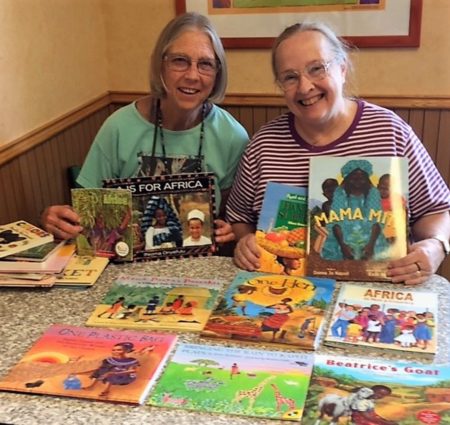
As I was researching The Gambia before leaving Oregon, I discovered that children’s books would be appreciated. I wasn’t sure how I would incorporate children’s books into my service as an agriculture volunteer, but I figured an opportunity would present itself. I asked, Carol Christ who is a coordinator for SMART (Start Making A Reader Today) an elementary school program I was volunteering with, to help me select the books. She did an outstanding job, and I was able to bring fifteen great books with me.
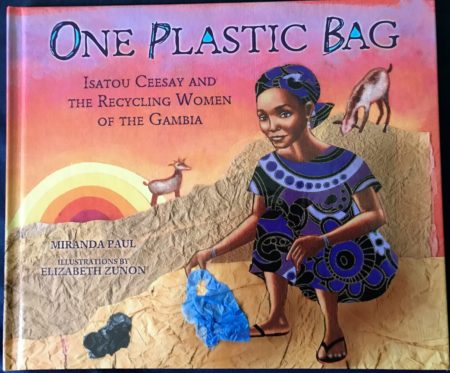
One Plastic Bag is about a Gambian women, Isatou Ceesay, who saw a problem with plastic trash in her community. With the support of Peace Corps Volunteer, Peggy Sedlak, she began the Njau Recycling and Income Generating Group (NRIGG) in 1998. Within a few years, they were able to build a skills center, where women can work and learn. The nonprofit is focused on better health for people, animals, and the environment, while creating an income stream for the women involved. Isatou went on to join the Peace Corps Gambia staff as a language and cultural facilitator (LCF), while continuing to work with NRIGG to empower women as they market their products internationally.
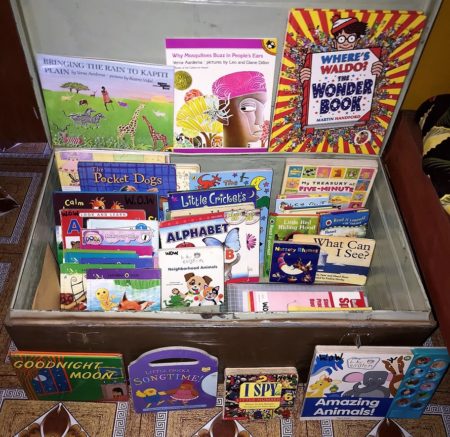
The opportunity to incorporate the books I brought with me turned out to be: WOW – Words on Wheels. Jenny Hamm, is the Literacy Coordinator in The Gambia, and is an Education Volunteer who extended her service for a third year. She is working for the cause of literacy by hosting workshops for volunteers and their local counterparts, and by training volunteers to pass on reading and text comprehension skills to others. She created a network of book sharing that reaches volunteers in all five regions of the country. I live in the North Bank Region and Jenny asked if the WOW library trunk could be located at my home in Farafenni, where volunteers can check out books for their communities. I now have I a home for “my book project” – WOW.
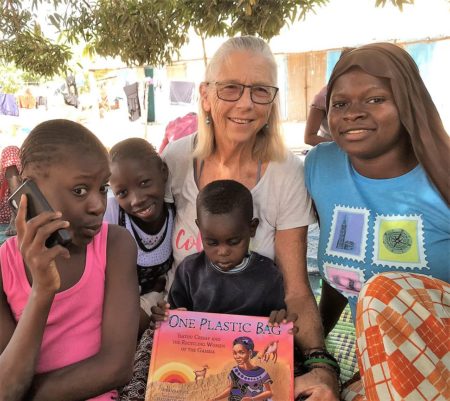
One activity I enjoy with my compound family is reading books together on the benteno after lunch. On Earth Day we read One Plastic Bag, because trash is still a big problem around here. Recycling and proper trash disposal was a routine habit for me in America, so I was very disturbed by how trash is handled here. Trash is just throw it on the ground where ever you happen to be, even if it is dangerous like razor blades. I was surprised this was true even for educated people like my LCF in training village. It was a shock to watch him open a package of tea and throw the cellophane wrapper on the ground. Another example was when we were out in the bush for our marathon march and our guides encouraged us to leave our lunch trash, instead of packing it out. I don’t think I’ll ever be comfortable throwing something on the ground that won’t decompose quickly.
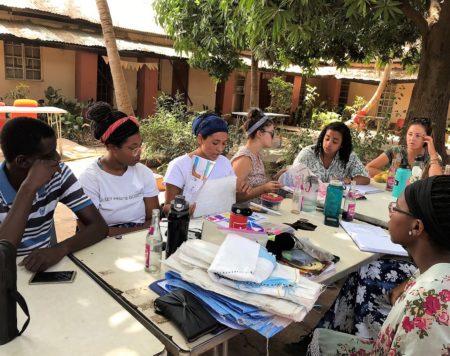
Recently I attended a literacy workshop taught by two Education PCVs at Eddys in Farafenni, to learn how to address literacy concerns in our communities. The Gambia ranks at about 55% for total literacy, with men having higher literacy rates than women. I find it interesting that many Gambians speak several local languages, but don’t seem to have a big interest in the written word, and I’ve never seen anyone reading for pleasure. English is the national language and is taught in all the schools, but I personally believe not enough emphasis is placed on the importance of English literacy is to be able to create a better future for themselves and their country.
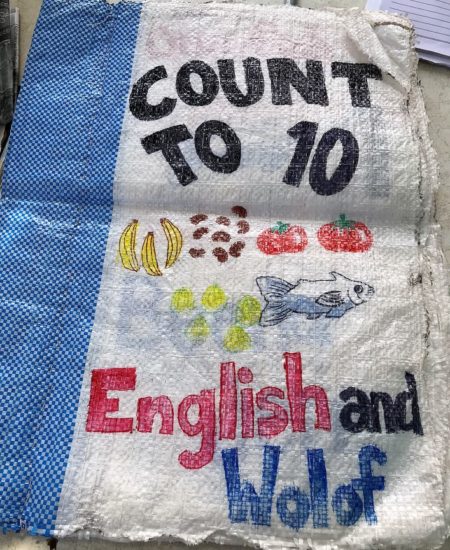
The literacy workshop was attended by PCVs from all three sectors and three local Gambian teachers. The presenters discussed how a teacher can make their own assessment tools for the students, so they can keep track of their progress in reading and writing. We were also shown how to create teaching supplies from readily available materials, such as constructing books out of rice bags, making flash cards from discarded cookie boxes, and letter tiles from wood or battery caps. I was very impressed with how enthusiastic the local teachers were to learn new skills to incorporate into their teaching methods.
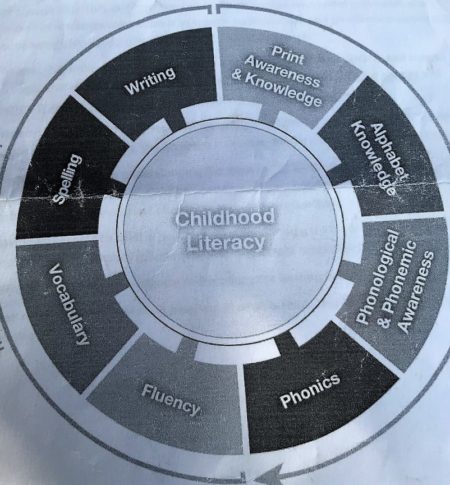
I want to promote literacy starting with the children in my compound, so I was very interested in understanding the literacy wheel as an assessment tool. I also hope to encourage the agriculture students to strengthen their English so they will have better employment opportunities.
Literacy Wheel Explained
- Print awareness and knowledge is a child’s earliest introduction to literacy, knowing words consist of letters and there are spaces between words.
- Alphabet knowledge is being able to name the letters.
- Phonological and phonemic awareness is paying attention to and understanding the sounds of letters and how they work. Phonological awareness is the umbrella concept of understanding sounds in speech relationships, and phonemic awareness is about being able to identify the smallest sounds in speech.
- Phonics is understanding that there is a relationship between letters and sounds through written language. Phonics instruction includes teaching letter shapes and names, phonemic awareness, and all major letter sound relationships.
- Fluency is the ability to read text with meaning and feeling, understanding when to pause and give emphasis, the accuracy in reading words and also speed reading.
- Vocabulary refers to understanding the meaning of words needed to read a text. After the early childhood years, children need to develop skills for making meaning of new vocabulary that they do not encounter in their everyday lives.
- Spelling is built on the understanding that words are made up of separate speech sounds (phonemes) and that letters represent those sounds.
- Writing is the ability to recognize and produce the writing system
- Text comprehension is making meaning of what is read and is the ultimate goal for reading.
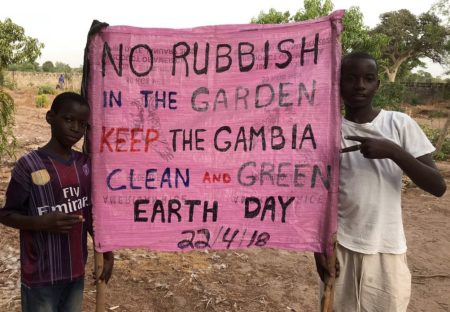
Earth Day Sign for the School Garden I look forward to making rice bag books for my compound children to keep and enjoy, because the WOW library trunk books go back into my house after reading time. For now I decided to make a rice bag sign for Earth Day at the school garden to remind them to keep the garden clean and green. This is a good example of how cross sector work can generate ideas to be applied for many uses.
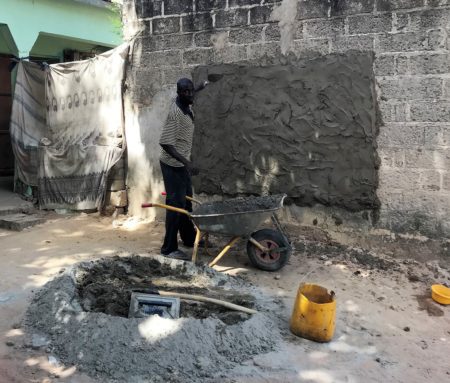
Outdoor Blackboard Being Constructed I had made a blackboard in my kitchen that I use all the time to make notes to self, and thought it would be fun to have a blackboard for my compound family to enjoy. When a mason was working in the compound a few weeks ago, I asked him to make a smooth surface on the block wall for a blackboard. After applying two coats of blackboard paint, it was ready to use. I’m thrilled with the results. Everyone took a turn writing or drawing on the blackboard, and I had to go buy more chalk the next day.

Trying Out the Blackboard The blackboard gets used constantly, and one girl comes home from school with her workbook and practices her lessons on the blackboard. The older girls like being teacher, as the younger kids bring out stools to attend class.
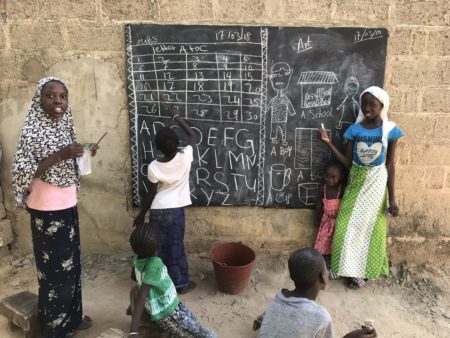
School in the Compound My host family compound has been very good to me and it was rewarding to create this blackboard for everyone to enjoy.
3 thoughts on “Literacy”
Amazing work Susan !
What a wonderful happening…seeing and being read wonderful books, having the chalk board available to them to use to play with and having them enjoy teaching each other…What a great project….
What amazing work and connections you are making, Susan! I love hearing about your experiences. Sending love to you from “back home” although you seem to be “at home” right where you are!
Love, Zohra
Comments are closed.